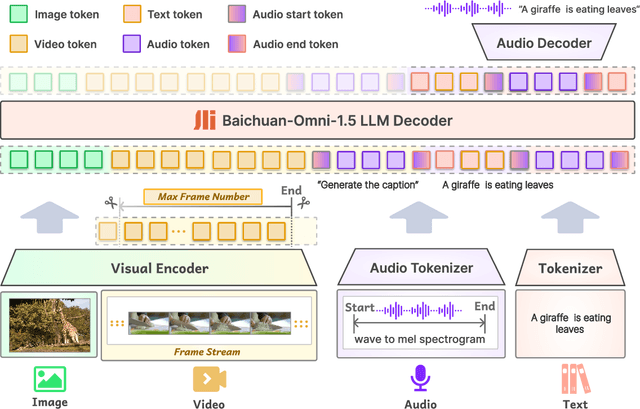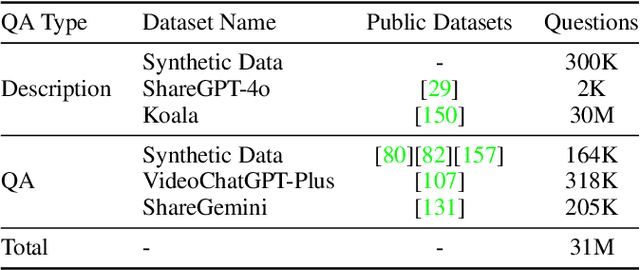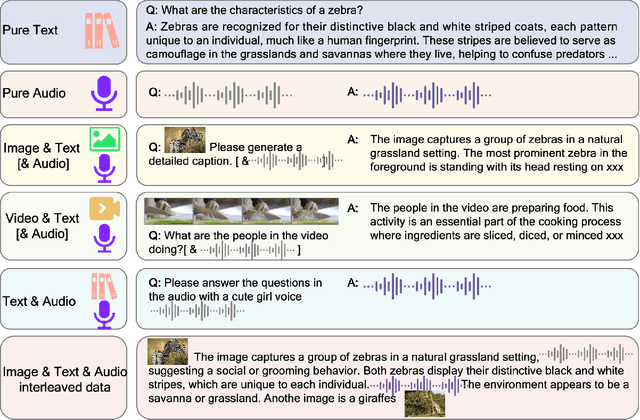Youquan Li
Baichuan-Omni-1.5 Technical Report
Jan 26, 2025



Abstract:We introduce Baichuan-Omni-1.5, an omni-modal model that not only has omni-modal understanding capabilities but also provides end-to-end audio generation capabilities. To achieve fluent and high-quality interaction across modalities without compromising the capabilities of any modality, we prioritized optimizing three key aspects. First, we establish a comprehensive data cleaning and synthesis pipeline for multimodal data, obtaining about 500B high-quality data (text, audio, and vision). Second, an audio-tokenizer (Baichuan-Audio-Tokenizer) has been designed to capture both semantic and acoustic information from audio, enabling seamless integration and enhanced compatibility with MLLM. Lastly, we designed a multi-stage training strategy that progressively integrates multimodal alignment and multitask fine-tuning, ensuring effective synergy across all modalities. Baichuan-Omni-1.5 leads contemporary models (including GPT4o-mini and MiniCPM-o 2.6) in terms of comprehensive omni-modal capabilities. Notably, it achieves results comparable to leading models such as Qwen2-VL-72B across various multimodal medical benchmarks.
Baichuan Alignment Technical Report
Oct 19, 2024



Abstract:We introduce Baichuan Alignment, a detailed analysis of the alignment techniques employed in the Baichuan series of models. This represents the industry's first comprehensive account of alignment methodologies, offering valuable insights for advancing AI research. We investigate the critical components that enhance model performance during the alignment process, including optimization methods, data strategies, capability enhancements, and evaluation processes. The process spans three key stages: Prompt Augmentation System (PAS), Supervised Fine-Tuning (SFT), and Preference Alignment. The problems encountered, the solutions applied, and the improvements made are thoroughly recorded. Through comparisons across well-established benchmarks, we highlight the technological advancements enabled by Baichuan Alignment. Baichuan-Instruct is an internal model, while Qwen2-Nova-72B and Llama3-PBM-Nova-70B are instruct versions of the Qwen2-72B and Llama-3-70B base models, optimized through Baichuan Alignment. Baichuan-Instruct demonstrates significant improvements in core capabilities, with user experience gains ranging from 17% to 28%, and performs exceptionally well on specialized benchmarks. In open-source benchmark evaluations, both Qwen2-Nova-72B and Llama3-PBM-Nova-70B consistently outperform their respective official instruct versions across nearly all datasets. This report aims to clarify the key technologies behind the alignment process, fostering a deeper understanding within the community. Llama3-PBM-Nova-70B model is available at https://huggingface.co/PKU-Baichuan-MLSystemLab/Llama3-PBM-Nova-70B.
FB-Bench: A Fine-Grained Multi-Task Benchmark for Evaluating LLMs' Responsiveness to Human Feedback
Oct 12, 2024



Abstract:Human feedback is crucial in the interactions between humans and Large Language Models (LLMs). However, existing research primarily focuses on benchmarking LLMs in single-turn dialogues. Even in benchmarks designed for multi-turn dialogues, the user inputs are often independent, neglecting the nuanced and complex nature of human feedback within real-world usage scenarios. To fill this research gap, we introduce FB-Bench, a fine-grained, multi-task benchmark designed to evaluate LLMs' responsiveness to human feedback in real-world usage scenarios. Drawing from the two main interaction scenarios, FB-Bench comprises 734 meticulously curated samples, encompassing eight task types, five deficiency types of response, and nine feedback types. We extensively evaluate a broad array of popular LLMs, revealing significant variations in their performance across different interaction scenarios. Further analysis indicates that task, human feedback, and deficiencies of previous responses can also significantly impact LLMs' responsiveness. Our findings underscore both the strengths and limitations of current models, providing valuable insights and directions for future research. Both the toolkits and the dataset of FB-Bench are available at https://github.com/PKU-Baichuan-MLSystemLab/FB-Bench.
 Add to Chrome
Add to Chrome Add to Firefox
Add to Firefox Add to Edge
Add to Edge